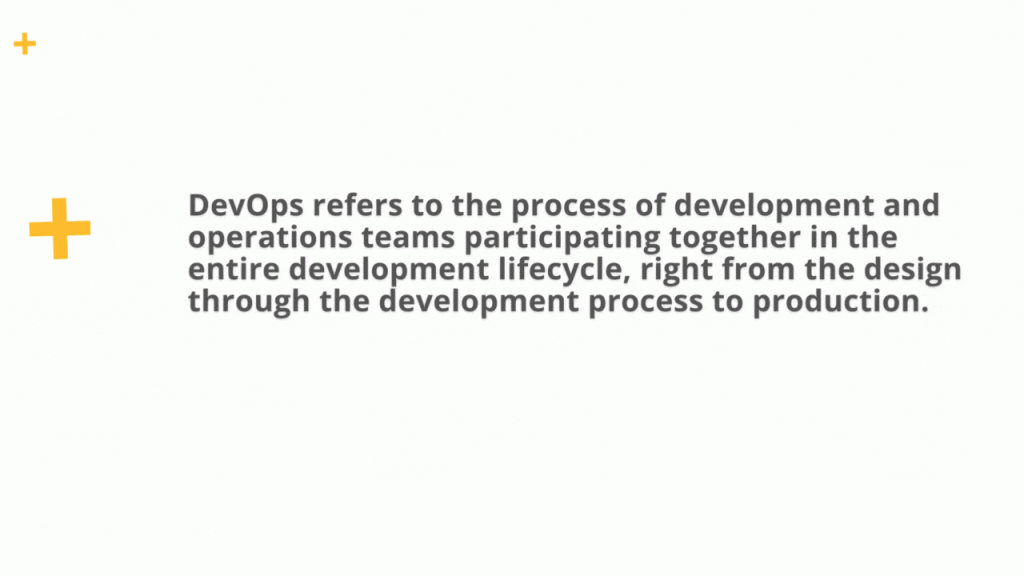What does DevOps do and what DevOps is not

What is DevOps?
Though DevOps acceleration is seeing an ever-increasing surge, confusions often persist as to what is exactly meant by the term DevOps and many times people conceive and interpret it in their ways.
Let us see some of the common definitions of DevOps
According to AWS, DevOps refers to the combination of cultural philosophies, practices, and tools that enhances an organization’s capability to deliver applications and services at high speed. Thus DevOps enables an organization to develop products at a faster pace as compared to organizations using conventional software development processes. DevOps thus enables an enterprise to better serve its customers and compete more effectively in the market.
ocus Keyword not found in your

What DevOps is Not
1) DevOps is Not an Independent Team
Companies that follow DevOps culture usually have a dedicated team that deals with DevOps-based tools and practices. But it should be noted that DevOps is not a separate team or a group of elite people. A DevOps team is a combination of all the cross-functional teams based in an organization. The development, operations, testing, and QA are all functionalities of a DevOps team. Creating an exclusive DevOps team for the sake of having one and consisting of members who are based on different sets of goals as opposed to the goals of the development team can complicate the problem of siloed structure rather than breaking it.
2) DevOps is Not a Tool
There are a host of tools provided by the DevOps community like Ansible, Jenkins, Chef, etc. Using these DevOps tools does not mean that you are implementing DevOps. These tools act as catalysts that enable you to implement such a practice. DevOps cannot be equated to a couple of tools. Such a correlation can often downplay the power and purpose of DevOps.These tooling along with teams, processes, and technologies are actually what constitutes DevOps.
3) DevOps is Not Implementable One Fine Morning
DevOps is neither magical nor a one size fits all solution. Most enterprises have embraced DevOps and many are on the path of adoption. Implementing a change often takes time. So one can imagine the case of DevOps, which emphasizes inducing a cultural shift from the conventional ways in which an enterprise operated. Rather than making a full switch transition to DevOps, consider implementing it piece by piece. You can consider reimplementing an already existing process using DevOps culture. Also, accomplishing a project using a particular tool does not mean that the same tool can be deployed for other projects.
What DevOps Is
The term DevOps was coined by Patrick Debois in 2009. The term was coined by combining development and operations. It is not a process or technology but rather a culture. DevOps involves drawing great practices from different domains by an organization and implementing them to improve their performance. Over time DevOps practices have evolved a lot with an established DevOps community that has advocated various tooling and practices that enable enterprises to accelerate their organizational commitment to DevOps.
1)DevOps Focuses on Feedback
It focuses on the flow of information and optimizing it to make it smooth. It involves passing the information from the production team or QA team back to the development team to enable them to have visibility and insights as to how the software performs in production and how it will be used by the end users. Thus feedback can provide clear visibility to the various stakeholders regarding the impact of the process on the customers and the organization at large. Optimizing the feedback loop is key to ensuring that feedback is received as quickly as possible.
2)DevOps Focuses on Continuous Learning
Continuous learning capitalizes on the flow and feedback of information. It involves identifying what can be learned from the existing processes and feedback and how it can further be used to improve the performance of the organization. It involves experimentation to envisage innovative ways to meet the needs and expectations of the customers. It also involves embracing failures as an opportunity for learning by adopting a cultural transformation in the approach to failure.
3) DevOps Focuses on Automation
DevOps culture places automation at its core. Automation is pivotal to an organization’s ability to fast-track the feedback process and pave the way to continuous improvement and learning. According to the State of DevOps Automation 2021 Report, automation is identified as a very important factor that enables rapid delivery combined with reliability. The report reveals that more than 50 percent of the respondents identified a lack of automation as the most important challenge.
4)DevOps Focuses on Collaboration
The word DevOps in itself emphasizes collaboration as it converges development and operations. In the traditional method of software development, the development and operations teams worked in silos. In such a model teams often exchanged blame with each other if anything went wrong. For example, a delivery lag was often accounted as a failure on the part of the production team. But in DevOps, the entire collective set of teams as a whole is accountable for the failure or success of any project. A DevOps culture emphasizes proper feedback, transparent workflows, and communication thus ensuring that timely corrective measures are taken to get processes back on track.
Conclusion
DevOps involves the right combination of people, processes, tools, and technologies. DevOps is often interpreted in many different ways. Irrespective of the way one interprets it, what ultimately matters is the organizational commitment to the DevOps culture.
Activelobby provides DevOps consulting services for organizations that are looking to start their DevOps journey. Activelobby’s DevOps expertise extends over 17+ years. Our team can help you in implementing your comprehensive development strategy. Get a Free Consultation Today!!!
